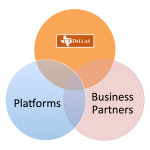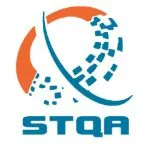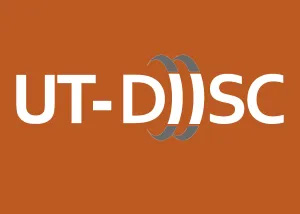Research Activities
Research in the UT Dallas Computer Science Department is organized into six main areas:
- Cyber Security
- Computing Theory
- Computer Systems
- Intelligent Systems
- Software Engineering
- Network and Telecommunications
Research activities are organized in several institutes and centers, and laboratories.
RESEARCH AREAS
Cyber Security
Cyber Security Research in the UT Dallas CS department is conducted within the umbrella of the Cyber Security Research and Education Institute. Its origins go back to October 2004 when UTD’s Cyber Security Research Center (CSRC) was established soon after which it received the NSA/DHS Center of Academic Excellence designation in Information Assurance Education (CAEIAE) in June 2004. After receiving the NHA/DHS CAE in Research in 2008 and a $1.8 million Scholarship for Service (SFS) award from the NSF in 2010, our efforts and in cyber security research education were combined to establish Cyber Security Research and Education Center in January 2012. Subsequently due to significant growth in faculty hiring, research and education in cyber security, the Cyber Security Research and Education Institute was established in April 2013.
For more info on the CSI, view the CS news article.
Learn about the faculty and their research projects.
Computing Theory
The computing theory researchers in the Computer Science Department are focused on issues related to algorithms, combinatorics, graph theory, and cryptography. Key research areas include algorithms, combinatorics and optimization, computational biology, computational complexity, computational geometry, cryptography, and secure multiparty computations. There are a number of faculty members involved in this area. Research in the computing theory group is supported by the National Science Foundation (NSF). Learn about the faculty and their research projects.
Computer Systems
The System researchers at UT Dallas perform world class research on diverse topics such as parallel embedded systems, embedded software, parallel computers and networking, data mining, data base systems, forensic analysis, multimedia, computer graphics, visualization, and programming language security. The research has been funded by external sources including NSF, NASA, NGA, AFOSR, ARMY, Raytheon, NOKIA, Texas Instruments, CISCO, AT&T, Texas Advanced Research Program, Microsoft, USA, and Tektronix. A number of young faculty members received the prestigious NSF Career award and AFOSR Early Investigator Award. Learn about the faculty and their research projects.
Intelligent Systems
Work in Intelligent Systems (IS) involves several aspects of Artificial Intelligence, with a special focus on Natural Language Processing, Speech and Machine Learning. Many faculty and students in the IS track are involved in the Human Language Technology Research Institute, which has been in existence since 2002. The goal of the Human Language Technology Research Institute (HLTRI) is to incorporate activities in a broad spectrum of disciplines such as natural language processing, speech recognition and synthesis, knowledge acquired from texts and text mining from a variety of genres. These activities enable computers to interact with humans using natural language capabilities, and to serve as useful assistants to humans by providing services such as automatic text understanding and retrieval, question answering, automatic translation and speech recognition. HLTRI is one of the very few Institutes in the world dedicated to the study and research of language and its automatic processing. Work in the HLTRI is cross-disciplinary, attracting researchers from several schools and departments in the University. This is justified by the cross-disciplinary aspects of language processing and artificial intelligence. Our faculty have expertise in several areas of IS, allowing them and their students to generate original and valuable research with many applications, e.g. processing electronic medical records, capturing the semantics of texts on the Web and in the social media as well as proving summaries of discussions and spoken dialogs. Learn about the faculty and their research projects.
Software Engineering
The software engineering researchers in the Computer Science Department are focused on issues related to effectively developing large-scale, complex systems. In particular, new categories of applications are emerging such as Big Data, Cyber physical, and autonomous adaptable systems, which continue to drive leading edge research in software engineering on diverse topics. Key research areas include requirements engineering, architecture, design, component-based engineering, testing and verification, static analysis, software maintenance and multi-agent systems. A number of faculty members are involved in software engineering research. Learn about the faculty and their research projects.
Networking
The networking researchers in the Computer Science Department are focused on issues related to the design and evaluation of next-generation computer and telecommunication networks. Key research areas include wireless and mobile networking, analysis and modeling of large networks, quality of service scheduling, network reliability and survivability, optical networking, network monitoring and Internet measurements, network security, group communication and IP multicast, algorithmic issues in wireless sensor networks, mobile ad hoc networks, cognitive radio networks, distributed algorithms, resource allocation, high-performance network architectures, and network switches and routers. Learn about the faculty and their research projects.
NSF Net-centric & Cloud Software & Systems (NCSS) I/UCRC
Net-centric systems offer a computing model for a variety of critical emerging applications, including Internet of Things (IoT) and distributed applications that are dynamically composed, verified, and validated in the field in real-time using highly reliable services. The net-centric systems researchers in the Computer Science Department are focused on issues related to various aspects of distributed embedded systems, including investigation of core technologies, middleware, and net-centric applications. The core technologies encompass cyber-physical cloud computing platforms, multi-core computing and power management techniques, secure communication and storage techniques, and other foundational research to support the deployment of a variety of different classes of net-centric applications. The middleware aspect includes research on efficient and robust frameworks to support the deployment of highly dependable embedded net-centric systems. A broad range of applications are being investigated, including command and control systems, emergency response systems, health care systems, and various applications of real-time cloud computing systems. Learn about the faculty and their research projects.
INSTITUTES & CENTERS

Cyber Security Research and Education Institute
Director: Dr. Bhavani Thuraisingham
The Cyber Security Research and Education Institute is dedicated to conducting focused research and education that help prevent, detect and solve cybercrimes.

Human Language Technology Research Institute
Director: Dr. Sanda Harabagiu
Human language technology incorporates a broad spectrum of disciplines working toward two closely related goals:
- enabling computers to interact with humans using natural language capabilities
- enabling computers to serve as useful assistants to humans by providing services such as automatic text understanding and retrieval, information extraction and question answering, automatic translation, and speech recognition
The institute includes six research centers: the Center for Basic Research in Natural Language Processing, the Center for Emerging Natural Language Applications, the Center for Machine Learning and Language Processing, the Center for Search Engines and Web Technologies, the Center for Text Mining, and the InterVoice Center for Conversational Technologies.

Institute for Data Analytics
Director: Dr. Ron Bose
We operate a world-class organization in data analytics that serves the students and faculty of the University of Texas at Dallas as well as the external organizations who sponsor our work. Our goal is to provide extraordinary service to our clients, funded research opportunities for our faculty and employment opportunities for our students.

Net-Centric Software Center
Director: Dr. Farokh Bastani
The Center is designed to maintain a mechanism whereby the university environment can be used to collectively promote and undertake research, education, technology development, technology transfer, and technological workforce development to enable the nation to transition into the new, net-centric operations paradigm.

Center for Software Testing
Director: Dr. Eric Wong
The center’s primary objective is to promote further research and develop advanced cutting-edge technologies, with user-friendly tool support, for technology transfer. We will focus on closing the gap between the state-of-art research conducted in an academic setting and the state-of-practice techniques used in the field. We will assist practitioners, no matter what their previous level of experience with software testing and quality assurance, to be quickly brought up to speed on the necessary background knowledge and gain the ability to apply a cost-effective set of procedures tailored to their specific projects.

iPerform: Center for Assistive Technology
Director: Dr. Ovidiu Daescu
The I/UCRC iPerform center is an NSF funded research center that represents collaborations of professors and scientists at the University of Texas at Arlington and the University of Texas at Dallas. Its primary mission is to bring together university and industry researchers to advance basic and applied research in Assistive Technologies to enhance human performance.

Center for CS Education and Outreach
Director: Dr. Jey Veerasamy
The center’s mission is to introduce the magical world of Computer Programming in enjoyable manner to every school student in greater Dallas area & beyond.

The Dallas Institute for Interactive and Spatial Computing (UT-DIISC)
Director: Dr. B. Prabhakaran
The goal of the University of Texas Dallas Institute for Interactive and Spatial Computing is to incorporate activities in a broad spectrum of disciplines such as computational geometry, computer graphics, high-dimensional data analysis, human-computer interaction, information visualization, multimedia, and virtual reality. These activities enhance knowledge and human performance through bioinformatics, physically based modeling and simulation, and training and education applications.
LABS
Applied Logic, Programming-Languages and Systems Lab
Computer Graphics and Animation Lab
Distributed Systems Lab
Speech Processing Lab
Wireless Networks Lab




